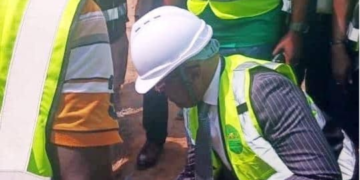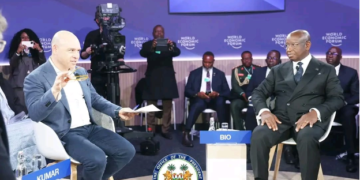
By: Ing. Yayah A. B. Conteh.
The general conditions for the poorest segments of our global society have continued to worsen in several respects.
The nature and causes of underdevelopment, especially in many developing countries, differ across regions.
It has been acknowledged that developed countries are generally categorized as those that are more industrialized and have higher per capita income in contrast to developing ones which are less industrialized and have lower per capita income.
Economists generally agree that development and growth are influenced by four factors, namely: human resources, physical capital, natural resources and technology.
The governments of highly developed countries focus on these areas to enable them propel ahead in their development strides.
Apart from the high rates of unemployment which is one of the common characteristics of developing economies, the problems of corruption, poverty, war, hunger, healthcare, education, etc., also add to the list of the woes and challenges experienced by most developing countries.
The notion that the less developed countries are exploited in their dealings with the developed world is widely held and has been in existence for a long time. It lies deeply embedded in some learned scholars theory of imperialism. It is also a major tenet of proponents of the theory of neo-colonialism.
It is universally acknowledged that part of the prosperity of richer nations is due to the fact that people in the developing countries are not getting a fair deal, due fundamentally to the shortcomings of aid flows and the trade barriers which the developed countries have raised against imports from the least developed ones.
Studies and research have shown that the richer countries of the planet have always tried to live up to the commitments they made in adopting the United Nation’s so-called Millennium Development Goals, which they adopted in the year 2000, and which include: the provision of universal primary education, gender equality and women empowerment, eradication of extreme poverty and hunger, reduce child mortality and improve maternal health, combatting HIV/AIDS and other diseases.
Thus, while China, India and several other countries classified as developing nations have achieved impressive growth in recent years and parts of Asia and Latin America too have seen major positive changes for the better in the realization of the Millennium goals, much of sub-Saharan Africa remains mired in abject poverty.
The need to break new ground in policy research henceforth cannot be over-emphasized here.
The question that readily springs to my mind in the course of this discussion is: What really then is a healthy nation, and what can we do in Sierra Leone, or in developing nations as a whole, in order to make them healthy ones?
I have always looked at the idea of a healthy nation from a multi-dimensional point of view.
Sierra Leone, for example, like many other developing countries, is one which undoubtedly aims at strengthening her economy and, in doing so, she has to improve upon several issues including, but not limited to, her agriculture, industry, science, sport, research, etc.
At present, however, we rely greatly on foreign experts to assist us in most of the national challenges that confront us which, otherwise, would have been successfully tackled by our local experts.
Are we always going to sit down and leave our burden to foreign experts? To me, the answer to this question is an emphatic “No”.
There is every need to train our local man-power who will be lettered enough to meet the challenges presented by most of these Millennium Development Goals, with our government in the forefront to combat these challenges headlong. The urgency to get suitable qualified local experts is so great that we can hardly wait any longer!
The education acquired from secondary school, vocational to tertiary levels should be perceived not merely as preparing groups of future leaders working assiduously in these educational establishments with the sole aim of only acquiring knowledge to pass exams, but rather, to work hard in the building of a healthy nation.
Nor even do we expect our agriculturists, having graduated from universities, to embark upon the planting and harvesting of potatoes and cabbages at their backyards or, further still, our engineers to construct highways and steel plants on paper only, to be eaten up by termites, rats and cockroaches! In all of these indeed, the implementation of the practical applications of the skills and expertise they must have acquired along the way would be of paramount importance in the building of a healthy nation, with all efforts geared towards the realization of the Millennium Development Goals.
Institutions housing these students should be seen as academic reservoirs where students go with the sole aims and objectives to learn all the skills and know- how at realizing these goals, as the solutions to the future of these developing nations lie squarely in their hands.
Lets imagine what our country would look like in AD 2080. By then most of us reading this article would have changed time for eternity.
I pose yet another question: Are we going to train better heads to build upon the foundation laid by our predecessors in the quest to combat most of the challenges aforementioned? The answer is ours to contemplate.
I personally feel that the footprints in the sands of time are not made by merely sitting down and relaxing, but that we need to work hard to make our presence felt and our absence regretted.
This article is not intended as an academic treatise but rather a plea, and an impassioned and forceful plea at that, for a revitalization of concern from our home governments in particular, the upcoming students still in the process of searching for knowledge, and other enlightened stakeholders as well, in order to harness our God-given potential to combat problems derailing the progress and development of our developing countries.
My message is that everybody is a potential asset to the nation. The only challenge is our failure to fully exploit our potential to the advantage of the nation as a whole.
We may not be aware of it but the success of our nation depends upon you and me. So it’s high time we better refined our life style and approach in every conceivable way in order to meet the challenges and demands of the 21st century.
Ing. Yayah A. B. Conteh is the Director of the Mechanical Services Department (MSD) of the Sierra Leone Roads Authority (SLRA).
Tel. Nos: 076640364 / 077718805.
E-mail: contehyayahab2020@ gmail.com.
























